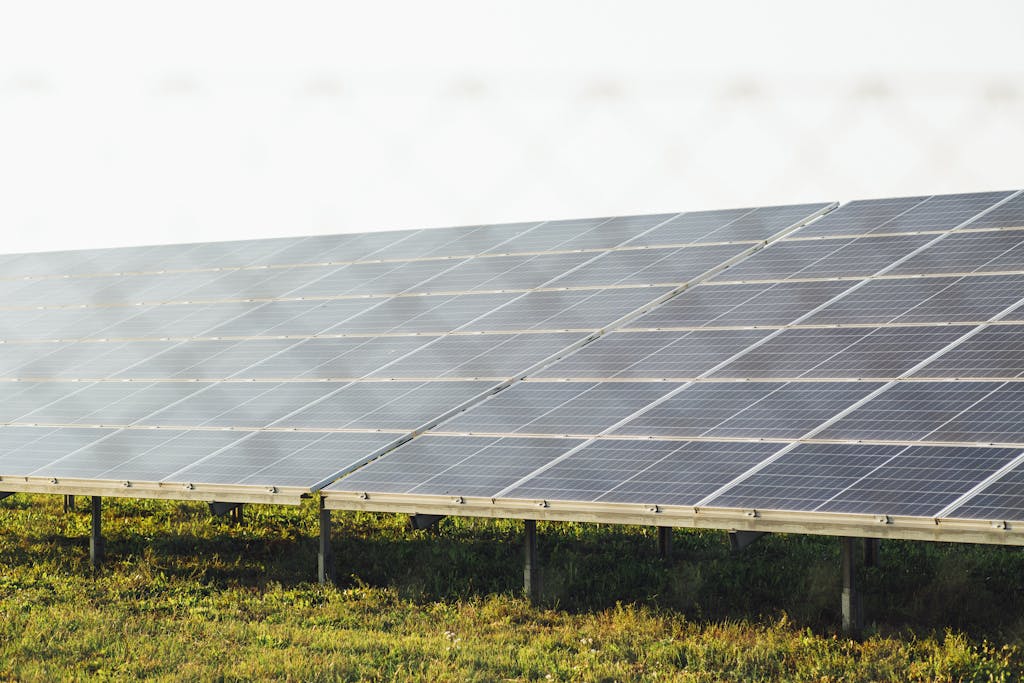As the saying goes, ‘Don’t let the grass grow under your feet.’ Have you ever considered the untapped potential of your land?

Leasing it for solar farms could be the key to unlocking a sustainable future for both you and the environment.
Curious to know more about how this decision could benefit you in more ways than one?
Benefits of Leasing for Solar Farms
When considering the benefits of leasing your land for solar farms, you can tap into a stable source of income while contributing to sustainable energy production. Leasing your land for solar farms can lead to increased revenue streams that aren’t only reliable but also environmentally friendly. By utilizing your land for solar energy generation, you aren’t only diversifying your income sources but also supporting the transition towards sustainable energy practices.
The revenue generated from leasing your land for solar farms can provide a steady stream of income over an extended period. This increased revenue can be a valuable addition to your overall financial portfolio, offering a stable source of earnings. Furthermore, by participating in sustainable energy production through solar farms, you’re actively contributing to the reduction of carbon emissions and promoting a cleaner environment for future generations.
Steps to Leasing Your Land
To lease your land for solar farms, begin by conducting a thorough evaluation of your property’s solar potential and suitability for solar energy development. Land evaluation is crucial to determine if your land receives adequate sunlight throughout the year and if there are any shading issues from nearby structures or trees. This evaluation typically involves assessing factors like solar irradiance levels, topography, and soil quality.
Once you have determined that your land is suitable for solar development, the next step is to negotiate legal agreements with solar developers. These agreements will outline the terms of the lease, including the lease duration, rental payments, maintenance responsibilities, and access rights for the solar developer. It’s essential to consult with legal professionals experienced in solar energy leasing to ensure that your interests are protected and that the terms of the agreement are fair and beneficial for both parties.
Conducting a thorough land evaluation and establishing clear legal agreements are crucial steps in preparing your land for leasing to solar developers.
Considerations Before Leasing
Before proceeding to lease your land for solar farms, it’s imperative to carefully assess the potential benefits and drawbacks of entering into such an agreement. Conducting a thorough land assessment is crucial in determining the suitability of your land for solar farm development. Factors such as sun exposure, terrain, and proximity to existing infrastructure play a significant role in the feasibility of the project. Additionally, understanding the local zoning regulations and environmental impact assessments can help you make informed decisions.
Contract negotiation is another critical aspect to consider before leasing your land. It’s essential to work with experienced legal professionals who can help you navigate the complexities of solar farm agreements. Pay close attention to details such as lease duration, rental rates, maintenance responsibilities, and termination clauses. Clear communication and transparency throughout the negotiation process are key to ensuring a mutually beneficial agreement for both parties involved.
Financial Aspects to Keep in Mind
Considering the financial viability of leasing your land for solar farms requires a detailed analysis of potential revenue streams and cost implications. One key aspect to evaluate is the return on investment (ROI) that can be expected from leasing your land for solar farm development. The ROI calculation should take into account factors such as the lease payments you’d receive, any maintenance costs you might incur, and the potential appreciation of your property value due to the solar farm installation.
Additionally, it’s crucial to explore the various tax incentives available for solar energy projects. These incentives can significantly impact the financial attractiveness of leasing your land for solar farms. Understanding the tax benefits, such as investment tax credits or accelerated depreciation, can help you maximize the financial gains from leasing your land.
Environmental Impact and Benefits
The environmental impact of leasing your land for solar farms can lead to significant benefits in reducing carbon emissions and promoting sustainable energy practices. By harnessing renewable energy from the sun, solar farms play a crucial role in decreasing our reliance on fossil fuels, thus lowering carbon footprints. Data indicates that solar energy produces little to no greenhouse gas emissions during operation compared to traditional energy sources. This reduction in emissions directly contributes to mitigating climate change effects. Furthermore, solar farms help in preserving natural resources and ecosystems by avoiding the environmental degradation often associated with extracting non-renewable energy sources like coal or oil.
In addition to reducing carbon emissions, solar farms also promote sustainable energy practices by providing a clean and renewable source of power. This shift towards renewable energy not only benefits the environment but also helps in creating a more resilient and diversified energy grid. Embracing solar energy through leasing your land for solar farms can thus have a positive impact on both the environment and energy sector.
Conclusion
In conclusion, leasing your land for solar farms can provide a lucrative opportunity for passive income and contribute to a sustainable energy future.
By harnessing the power of the sun, you can play a vital role in reducing carbon emissions and promoting environmental stewardship.
So, don’t let your land sit idle – consider the benefits of leasing for solar farms and reap the rewards of a brighter, greener tomorrow. After all, the future is as bright as the sun itself.







